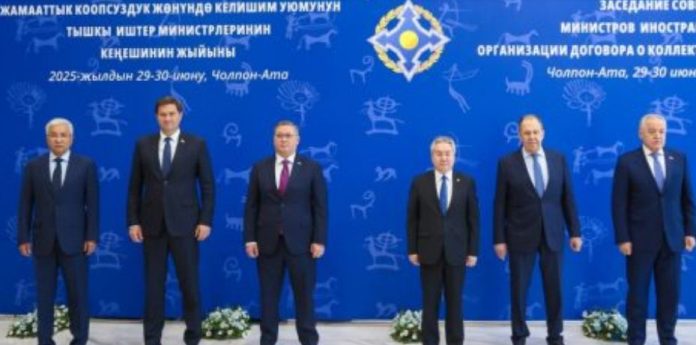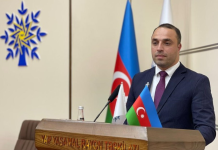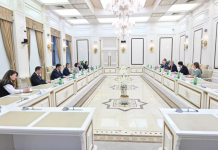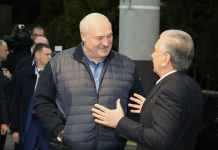By Catherine Putz
On June 30, foreign ministers from the Collective Security Treaty Organization (CSTO) member states met in Cholpon-Ata, Kyrgyzstan. The routine meeting comes amid Kyrgyzstan’s chairmanship of the CSTO, and follows recent gatherings of the CSTO security council heads in June and defense ministers in May. With one member on the way out, and Russia’s continued war in Ukraine, the organization’s role and heft remain open questions.
Kyrgyz President Sadyr Japarov and Foreign Minister Jeenbek Kulubayev welcomed the foreign ministers of Belarus (Maxim Ryzhenkov), Kazakhstan (Murat Nurtleu), Russia (Sergey Lavrov), and Tajikistan (Mukhriddin Sirojiddin), as well as CSTO Secretary General Imangali Tasmagambetov.
Absent was Armenian Foreign Minister Ararat Mirzoyan.
The CSTO formally launched in 2002, evolving out of the post-Soviet Collective Security Treaty (CST) which had been formed in 1992. The alliance counts among its members Armenia, Belarus, Kazakhstan, Kyrgyzstan, Tajikistan, and Russia – the latter widely viewed as leading the organization by dint of its massive size and overwhelming influence. Uzbekistan had been party to the CST but declined to extend its association in 1999, a decision also made by Georgia and Azerbaijan. Tashkent did join the CSTO in 2006, but withdrew in 2012.
Armenian authorities last year made clear their dissatisfaction with the CSTO, a break rooted in the organization’s inaction in regard to the conflict between Armenia and Azerbaijan. In February 2024, Armenian Prime Minister Nikol Pashinyan said the country would freeze its membership.
In June 2024, Pashinyan denounced the CSTO once again for failing to come to Armenia’s aid. “We will leave,” Pashinyan said during a parliament session. “We will decide when to leave. We won’t come back, there is no other way.”
Those comments came amid Armenia’s not-so-subtle distancing from the CSTO, a trend that has only solidified. Armenia skipped the November 2023 CSTO summit in Minsk, Belarus, did not show up for a CSTO joint military exercise in Russia in August 2024, and also skipped the November 2024 CSTO summit in Astana, Kazakhstan.
In December 2024, Pashinyan remarked, “We have fulfilled all our allied obligations [to the CSTO] accurately, both morally, politically, and legally, but the allied obligations towards us have not been fulfilled.” He continued, “In a difficult moment, they left us alone, they abandoned us, and yes, there are opinions that we were betrayed, and I have no argument to assure them otherwise.” The break had passed the “point of no return,” he said.
Despite these comments, and Armenia’s persistent absence from CSTO engagements, Russian authorities appear at times somewhat deluded. In December, Lavrov told journalists, “We hear these rumors that the prime minister of Armenia spoke and discussed many things on this topic in the parliament. We do not impose anything on anyone. We are convinced that making the most of [CSTO] membership is in the interests of Armenia’s security.”
Russia may be catching on, finally. Following the recent foreign ministers meeting in Kyrgyzstan, Lavrov remarked, “We still consider Armenia the full-fledged member of this organization but, undoubtedly, a full-fledged membership implies participation and observance of all obligations under the CSTO charter documents. Including paying membership fees, by the way.”
In early June, TASS reported that Armenia had not paid its membership fees for 2024. Armenian Foreign Minister Ararat Mirzoyan, speaking in parliament, said that “Armenia has not paid the membership fee to the CSTO due to the suspension of its membership in this organization.” Mirzoyan added, as reported by TASS, “Yerevan is assessing all the risks of the decision to withdraw from the CSTO.”
For now, Armenia’s flag remains on banners for CSTO meetings.
After the recent gathering of foreign ministers, a CSTO readout noted that the states “adopted statements on issues related to international information security, countering radicalization leading to terrorism and extremism, the situation in the Middle East, as well as the establishment of the U.N. Regional Center for Sustainable Development Goals for Central Asia and Afghanistan.” The also discussed closer cooperation between the CSTO, the Commonwealth of Independent States (CIS), and the Shanghai Cooperation Organization (SCO) – the full constellation of Russian-dominated multilateral organizations.
Although specific dates have not been announced, as chair Kyrgyzstan will host the annual leaders summit later this year.

















